|
1/31/2017 Three Poems by Michael PrihodaDoll 3[i] what the sparrow carries is weight, is material of no god’s making. last week you said “i won’t stay long enough to disappoint you.” but here we are two suns distant a belt of rocks that drag us south in up-facing pools, our clothes burdened with receipts from visits of friends at our most disturbing. this week you said “the idea of a finish line doesn’t negate losing.” is it you or me who doesn’t find out who speaks an astronaut from an air bubble next week? Mask 4[ii] retell the witch hunts. we found wizards bathing in atomism, unexplainable, like the unreality broadcasts. how far haven’t we come? how far haven’t we gone? a muscle de-exercising its right to clench, mold a day around its axis, spin a substance of decay into an animal: name it progress. Benadryl as gateway to sleep, a former necessity as backseat driver. nobody is turning eighteen in this age. Mask 3[iii] for these times of glass & shatter, to the deepest parts of me where root the acorns of my better nature. this light has trespassed enough to let us know we are more broken than when we began [i] Two stone pedestals stand at the corner of a wall. Brush & grass have begun taking over the stone. Masks hang from some metal fencing & doll heads litter the undergrowth. A boy leans his head against a brick wall to the right of the photo. [ii] A boy stands, hands in pockets, to the right of a window. A woman sits beneath the window. A girl stands frame right, looking toward the window, wearing a bucket hat. All are masked. [iii] A girl in a mask of a wrinkled man sits at a piano bench. An older girl sits behind her on a pew with an unworn mask next to her. 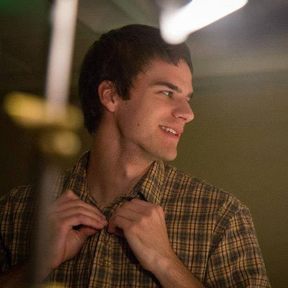 Bio: Michael Prihoda is a writer, editor, and teacher from Indianapolis, IN. He is the editor of the literary magazine and small press After the Pause. Publications of poetry, flash fiction, and art have appeared in Potluck, Rasasvada, Pretty Owl Poetry, and Spelk Fiction, among other locales. He is also the author of two chapbooks and five poetry collections, the most recent of which is The First Breath You Take After You Give Up (Weasel Press, 2016). 1/31/2017 Six Poems by Margarita SerafimovaYou were naked in the shadow. I saw a cup of coffee by your side, you were sitting with the calm of a man with a kingdom of culture. I was in the sun. Ancient, lightened by sensuality, palms stand in the heavy sun in the wind, and move, Mauritanian deities with no end in the light Not superior, the eagle, brown and mottled, leaving the white rocks, and lightly entering the wind above the sea, is peerless. Exploded flames of dark green swelter, centennial juniper trees embody the almighty, eternal life of the Cyclades. Falcons fly above. I stood above the vertigo of the wind with a mind full of emptiness, and said to the sea: You took me. You were ascending the hill when you met death. In a joyous voice and with no words, she told you where to find the spring, and you kept ascending.  Bio: Margarita has published one book of poetry, "Animals and Other Gods", in the Bulgarian (Sofia University Press, 2016). Her second book, "Demons and World", also in the Bulgarian, is forthcoming in March 2017 (Black Flamingo Publishing, Sofia). 1/31/2017 Burial Fund by Evan McMurryBurial Fund Rielle, she was the excuses type. But her manager refused to believe anybody would be so ghoulish as to lie about her mother passing just to get out of a shift. “Take as much time as you need—” Carly pledged the server, the line already dead. The staff gathered in the kitchen for the pre-shift meeting, where Carly felt solemn-bound to tell them the news. The servers dwelt on their boots, pulled at their checkered apron strings; too young to have lost a parent, they were bullied by its enormity. Carly, who hadn’t spoken to her mother in years and knew the shape if not the weight of the girl’s loss, did what she hoped others, god forbid, would do for her, and proposed a burial fund. That slapped the staff from their funk. Nobody was thrilled about handing over a chunk of tips, not for Rielle, cash-starved every fourth week of the month, sharking tables, whining over lunch shifts, demanding extraordinary exceptions for her ordinary problems. They could guess where her money went. Carly assured them no one had to give; if they could afford it, if they thought it might help, so on. She babbled as they stared blankly at her. In the half year since she’d been made manager a gulf had split open between herself and her former peers; they’d taken to enacting her suggestions with an ironic subservience, mocking her authority by complying with it; the more voluntary she made this fund, the more involuntary they would treat it, punishing her for every dollar donated until she would beg them to keep the money she’d solicited. But generosity gathered with every table sat. The first cut handed over a twenty-dollar bill; the server working the private party in back declared his contribution of forty. (A way of boasting about his take-home, no doubt, but Carly took it.) The head bartender forwarded a $50 tip off one too-drunk tab. By closing the fund neared $500, double the haul she’d hoped for. As she secured the rubberbanded wad of bills in the bar register Carly praised herself for pushing the staff into a charity made all the more noble in being for someone none of them liked. The next afternoon, thirty minutes past her in-time, Rielle staggered through the back door, crazy-eyed, gin’s flower-mean stench on her, slammed her purse into her locker, seethed at the first person to attempt condolences, and began making her rounds on the floor, muttering profanities, oblivious or perhaps hyperaware of the craned necks of happy hour customers, daring their judgments. Carly was retrieved. Reille needed only one look at her boss’ face. “Fuck you and this whole fucking place,” she lit in. “Treated me like shit since the moment I got here—” Tattooed on both Reille’s inner forearms was a flock of blackbirds, such that (she once said) when she pushed her arms together, in moments of panic, her flesh formed the sky. Now she seemed to be flinging these ravens at her boss, who scooted back in awe, before two broad-shouldered line cooks finally crowded the screaming server out the side exit. Her voice cracked into a sob as the door shut against her. The staff watched wordlessly from the floor, their introduction that grief involved more than sadness. For the rest of the shift Carly hid in her office, shuffling and reshuffling invoices until her palms purpled from cheap ink. She’d wanted nothing more than to call her mother a few months back and brag about her promotion, barely past her Associate degree and already manager of a thirty-dollar-a-plate restaurant—she, who used to scamper down the grocery aisles helping match items on the shelves to the coupon sheet in her hand. That was back when the two of them spent each night leaned over her homework, her mother prophesying that hard work would vault Carly beyond her limits; long before she started writing bad checks, got caught swiping from the register at the dress store, took out loans in her daughter’s name, ruining Carly’s credit. The last Carly had seen her she’d borrowed $100, pinky-swearing to pay it back the next day. Carly left message after message pleading to forgive the debt, until she realized the debt was the point, the woman’s snarl: cheat or be cheated. Her daughter was just another debtor she’d outmaneuvered. Carly’s phone buzzed just as she finished counting the banks: Underground, read Theresa’s text. Better get in on this before it's gone. “How much is left?” she demanded as she stormed into the subterranean dive dark with black-uniformed servers. Sullivan, lumbering long-bearded athlete of after-work revelry, bellowed a welcome, then ordered a round of single-malt that forced the bartender up a stepladder. “That oughta take care of the rest of it,” he said, pulling the familiar roll of bills from his pocket. Carly yanked the fund from his hand. “What’s wrong with you?” “Plenty,” he assured her. “But as for this, specifically? We collected cash for our former coworker. Our former coworker rejected it. It reverts back to us. We couldn’t think of a better way to spend it than by having ye olde good time, which you may or may not remember was pretty much impossible when said former coworker was around.” “Her mother died!” “We toasted her,” Theresa swore, petite hand presenting an empty pint glass as evidence. “First round.” Sullivan: “Can we have our fancy scotch now?” “It’s not your money—” But the moment this left her lips Carly knew it was wrong. She searched the faces of Theresa, her employees, the bartender waiting to pour from the bottle of scotch older than all of them, then stuffed the cash into Sullivan’s paw and escaped the bar ignoring hollers to stay and enjoy the money it had been her idea to raise. Theresa arrived on Carly’s doorstep two rounds later, per their plot to never be seen leaving together. But she didn’t usually carry such a cockeyed look. “You didn’t have to do that.” “You all got loaded off a woman’s burial fund,” Carly said. “We toasted her.” Theresa raised the ghost of the earlier glass. “To Rielle’s mom!” They slept together that night and never again. An hour of phone calls via emergency contacts (her mother unlisted among them) the next morning eventually revealed Rielle’s mom’s sister’s address. Carly wrote a check for $237, the remaining amount she’d failed to salvage the night before, mailed it with a note saying it was from Rielle’s coworkers, to be put to the best use possible. She added she was sorry for their loss. Carly only technically had $237. Her father had loaned her a couple thousand back when the creditors came hounding about her mother’s past-dues; she still paid him back a fistful every month. She called now to tell him she’d miss a round. “I don’t want your money, tadpole,” his automatic line. “Spend it on you.” But he had back problems, had been out of work for months. A letter arrived from the aunt; Rielle, it read, hadn’t shown up to the funeral. Please, tell her we love her, finished the note in crimped ballpoint script. Please, tell her to come home, even for a day. Enclosed, a snapshot of Rielle’s mother, taken at a pizza joint blinging with arcade games, a birthday party lit mid-eruption around her. Carly interrogated her face, a tired reluctant smile yielding no more to her than it had to the photographer. She and her daughter had the same high cheeks and squinted eyes, not pretty but striking, beauty you didn’t gaze at but still could snare your eye. What crime had this woman committed to ignite her daughter’s loathing? Or had it just been an overserving of selfishness and cruelty made rancid by resemblance, forcing Rielle each time she looked at her mother to detect the same in herself? On her day off Carly drove to Rielle’s listed address; an eviction notice stamped the door. She scared up the landlord’s number, but he said he couldn’t give out her forwarding information even if he knew it, which he definitely didn’t. “Probably in the gutter somewhere,” he cackled, and Carly told him to be ashamed. She quizzed the servers; they shrugged; all those nights guzzling their tips elbow to elbow, they knew nothing of each other. She phoned the unemployment office, but Rielle had never filed a claim; the police department hadn’t picked her up. Her phone number stuttered straight to voicemail, full; soon the line was cut. Carly kept the photo of Rielle’s mother. Throwing it away seemed as ghastly as spending the burial fund; mailing it back felt cruel. Most of the time she didn’t think about it, except for those nights she guzzled a glass of wine too many (Theresa on her phone, you up?), when she retrieved the snapshot from her nightstand drawer and examined it on her narrow balcony. They hadn’t even been able to find a picture of the woman with her daughter. Carly quit the restaurant, good riddance. Her management title nabbed her a job running the accessories section of a department store; soon she was overseeing the whole floor. She paid her father back the last of the loan. (“I don’t want your money, tadpole,” he said, but the check was cashed.) And she went out for drinks one January evening with a seasonal temp, Allison, who started sleeping over at her place every night. They were in Carly’s bed when she looked up at a constellation of photos pinned to the wall. “Who’s that?” she asked and Carly identified each member, until, having exhausted the relatives, she asked where her mom was and Carly’s eyes slid by habit to the photo of a woman at a pizza joint. “Tell me about her,” Allison said. Carly’s tale began with her descriptions of her mom pushing her down the grocery aisle in a cart, Carly learning to read by eyeing the coupons against the logos, real memories still warm. Then she improvised. “She was always there for me. Helped me when I needed money.” Carly imagined what Rielle would have wanted from her mother. “She forgave me no matter what I did. No matter what trouble I got in, she welcomed me back. There wasn’t anything I could do that would cost me her love.” “I’d love to meet her.” “She passed,” Carly said, and listened to the protest of shock, the same she’d once uselessly given Rielle over the phone. “I’m so sorry.” Carly untacked the photo for which she’d paid $237, saw again in the woman’s tired face the resemblance to the server who’d stalked the restaurant furious at some unseen force. Early on, when they were both new hires at the restaurant she and Rielle had gotten sloppily drunk one night after work, at a bar the rest of the staff had never heard of. Back at her apartment, Carly confessed for the first time to anybody that she hadn’t spoken to her mother in years; in return Rielle showed her coworker how she made the sky with her flesh. They’d ended the night curled in each others’ arms, too gone to do anything but find comfort in another person, a comfort that didn’t even last the morning: from the moment she awoke Rielle detested Carly for this intimacy, enfolding her with the rest of the world as a threat that preyed upon a weakness she hadn’t chosen. Now every day, as she passed down streets pocked with gutterpunks or past bus benches slanted with bodies, Carly hunted in her peripheral vision for a high-cheeked, squint-eyed girl, pressing her arms together, to whom death had cancelled no debts. “Don’t be sorry,” Carly said, tearing the photo. “They owe.” --------------------------- Image - Gary Pearce www.flickr.com/photos/pearciecouk/ 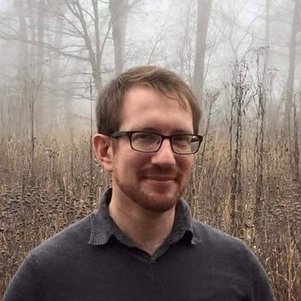 Bio: Evan McMurry graduated from Reed College and received his MFA from Texas State University-San Marcos. His fiction has appeared in more than a half-dozen publications, including Post Road and Euphony, and his reviews have appeared in Bookslut and elsewhere. He is currently the social media editor for ABC News. 1/30/2017 Four Poems by Christopher HivnerI Wrote This One While Staring at My Desk at Work I miss her, the reasons why aren’t important, although the smell of her skin still lives inside me held there by invisible hands with slender fingers. The Vibrating Sky Two lane highways lead me farther into a night that breaks into diamonds twirling past as I leak oil in patterns on the tar to signal the mothership or another ship or any craft to lift me away into the black felt bosom of the vibrating sky. No moon tonight for me to steer by, no light to reveal my craters and dried salt seas, the road is straight, no snaking, no turns into glory or head-ons with truckers wired by amphetamines. The car engine whines as I push the gas pedal through the earth to its core, the road’s yellow lines whip at me like a cat o’ nine tails flaying my skin until its striped red, a burn for my lack of penitence, a reminder of my past on the chase. A two lane road of two way dreams and I’m driving the wrong direction into a night of cut diamonds raining down from the vibrating sky. Do the Stars Know Our Names? Some say it’s only a matter of time until the world ends but maybe it will go on forever like the stars that spell your name through time. I hope it lasts until the fabric of the night frays into a single thread and wraps us together in a pulsing cocoon. It’s a matter of time until we end and the world goes on, the universe spins while we stand still until the stars forget us. Itinerary Where is that feeling? The one that drove me, the itch that made breathing worthwhile. Where do I need to be to find it again? South? North? My bags are packed I just need an itinerary. The water rolls by, supple shapes formed in the wavelets, amoebas stretching around one another, elongating, narrowing, living, moving on. If I lay on the water it will take me somewhere. East? West? The fishermen cast their lines and wait, patient, contemplative, assured that the fish are right there, in the spot they’ve chosen. It’s all a question of the bait. Live? Synthetic? The right morsel will catch the right fish. The water doesn’t stop moving but it won’t accept me, I don’t belong to the sea but to another element guiding me with telluric energy to the horizon far away. Backward? Forward? My bags remain ready, tell me where to go. 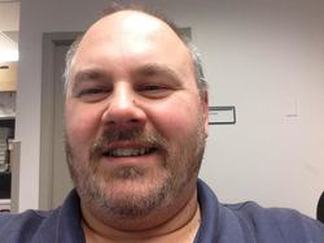 Bio: Christopher Hivner: writes from a small town in Pennsylvania surrounded by books and the echoes of music. He has recently been published in Saudade and Dead Snakes. A chapbook of poems, “The Silence Brushes My Cheek Like Glass” was published by Scars Publications and another, “Adrift on a Cosmic Sea”, was published by Kind of a Hurricane Press. website:www.chrishivner.com, Facebook: Christopher Hivner - Author, Twitter: @Your_screams 1/30/2017 Three Poems by Charlie BriceEmbrace The human heart pumps 15 CCs of blood at a time and that’s how much it holds when it stops We measure everything except the grief of a daughter whose father, Fethi Sekin, was killed by a car bomb in Izmir last week Killed by some zealot who thought he’d save Turkey or purify Islam or purchase his way into heaven with Fethi Sekin’s 15 CCs But the photo in today’s paper is of Mr. Sekin’s 8 year old daughter who does to his coffin what she wants to do to her daddy She hugs it, lays her head against its flag-draped contour, and dreams of the times they’ll never have Happy New Year January 2, 2017 and I go shopping at the Giant Eagle in Edgewood. I buy enough groceries for the 65 million who didn’t vote for Trump, and checkout in Adriana’s line. I ask this lovely black woman, her eyes like languid pools, how she’s doing. Not good, she says, someone stole her wallet the day before Christmas with all her credit cards and ID and overdrew her bank account by $185 dollars. The worst is that her wallet was lifted in the bathroom of Giant Eagle where she works. Her eyes now two cloud-covered moons. I’m sorry, I say, but it will pass and tell her that, years ago, my wallet was stolen from the front seat of my car where I’d left it after I dropped off our son at the airport for his first trip away to college. Evidently my heart and most of my brain flew off with him. I might as well have put a sign on the wallet that said Here, Steal Me, which makes Adriana laugh, and I am happy to give her a little New Year’s cheer. On the way out of Giant Eagle I pass a middle-aged couple. The woman says to her man, You took a long-ass mother fuckin’ nap-- twelve hours! No, he replies, and shakes his head like a wet dog. Yes, says his woman, a long-ass mother fuckin’ nap. I think of all those who stayed home during our last election and didn’t vote. I think of what that long-ass mother- fuckin’ nap cost us all. Election 2016 Our hundred foot oak stately for so long as we could remember governed our backyard with the kindness of gnarled branches that spread gifts of shade in summer, stark strength in winter. Our oak that withstood fence construction ivy infestation generations of kids who climbed its bark and swung from its sturdy limbs. Our oak that survived and endured vicious varieties of Zephyrus’ wrath: scathing sun, freezing rain, dilating and contracting water under its woody skin. Our lovely oak lost two huge branches, one calm and cloudless afternoon, that fell on our old bent locust tree; like a forest of dominoes that locust collapsed, in turn, on our house. Our ancient oak that had given us so much turned out to be rotten inside, a master of backyard trumpery, those torn limbs revealed an empty inner core that left no choice but to take it down. Our precious oak gave way to the tree man’s spiked boots that gripped her creviced derma. Chainsaw buzz dug into my soul’s flesh while her severed and noosed limbs were lowered to the ground. Our oak was no more. We were left with scorched earth, a parched and crooked swale, a hollow stump out of which nothing could grow. 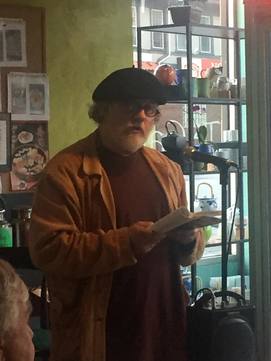 Bio: Charlie Brice is a retired psychoanalyst living in Pittsburgh. His full length poetry collection, Flashcuts Out of Chaos, was published by WordTech Editions (2016). His poetry has been nominated for a Pushcart Prize and has appeared in The Kentucky Review, The Atlanta Review, Hawaii Review, Chiron Review, The Dunes Review, Fifth Wednesday Journal, Sports Literate, Avalon Literary Journal, Icon, The Paterson Literary Review, The Pittsburgh Post-Gazette, Spitball, Barbaric Yawp, VerseWrights, The Writing Disorder, and elsewhere. 1/30/2017 Two Poems by Howie GoodAnarchy in the USA If there are rules, no one here has bothered to learn them. My first thought was, “Run!” Others chose suicide. Soon I was stumbling around like the bad kids who huff glue. Mothers dumped raw meat out into the street in protest. Sirens began to woo-who, woo-who. I was in a headspace that felt dreamlike, and that was pricked with stars I couldn’t identify, 50 by last count and all of them always promising to return to their prescribed orbits. The Loser’s Guide to Street Fighting It’s 4 a.m. Your body’s trembling. After you die, it’s not yours anymore, anyway. Die knowing something, a monster, a devil in his giant motor vehicle. That’s not quite what I want. You need to leave. You don’t belong here. Ooh you are going to fuck yourself. You can hear them — you can hear the gas grenades all up and down the streets. The crowd is being pushed back, and the gas is coming. -------------------------- Image - Chiara Stevani www.flickr.com/people/stevanichiara/?rb=1 https://creativecommons.org/licenses/by-nc-nd/2.0/ 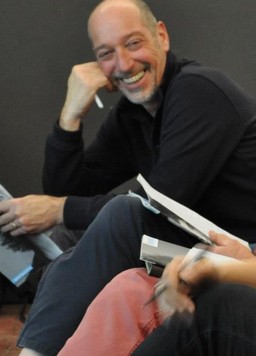 Bio: Howie Good is the author of Dangerous Acts Starring Unstable Elements, winner of the 2015 Press Americana Prize for Poetry. His other books include A Ghost Sings, a Door Opens from Another New Calligraphy and Robots vs. Kung Fu from AngelHouse Press (both 2016). 1/29/2017 Four Poems by Mikel KWho is crazy? Besides you and me? Some guy, wearing a cowboy hat and a beard, who is some higher up in the Trump campaign, just said that poor people have it made; that they were richer than the rich a hundred years ago. I don't have it made and neither does he. Nobody does. We all have our crosses to bear. You are beautiful You are beautiful as you are, wherever you are, however you are; if the sun is shining, if the moon is out, upon waking, and before you fall asleep. You are beautiful when you are pouting. You are beautiful when you smile. You are beautiful when you are here. You are beautiful when you are gone. You are beautiful in person. You are beautiful on the telephone. You are beautiful here. You are beautiful there and I’m glad that you are here with me. Pain Street Down on Main St. there’s a pain streak where the losers, and the down and outers go. I lost my Love there; she had fair hair, left with a man with a guitar on the go. Because of her Because of her, he bit his nail so hard that his finger started bleeding. The pain surprised him. He wanted to cry. Not because of his fingernail, but because of her. -------------------------- Image - Emily Kneeter www.flickr.com/photos/emilykneeter/ https://creativecommons.org/licenses/by/2.0/ 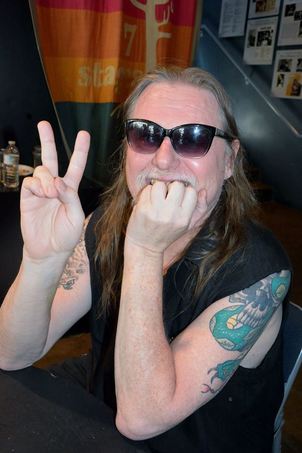 Bio: Mikel K is a poet and memoirist living in Atlanta, Ga. K was voted best Atlanta Poet three years in a row, by readers of Creative Loafing, Atlanta's weekly newspaper. He has a BS in English with a minor in Journalism from Georgia State University. He drank his way out of Florida State University one class short of a business degree. Poetry by Mikel K has, recently, appeared in: Subtle Tea, Inbetwen Hangovers, Drown In My Own Fears, Your One Phone Call, Harbinger Asylum, Indiana Voice Journal, Dissident, Voice, Dead Snakes, Horror Sleaze Trash, Poeticus, Anti-Heroic Chic, Section 8 Magazine, drown in my own fears, poetic diversity, Zygote In My Coffee, High Coupe, The Blue Lake Review, Swimming With Elephants, Ceremony, Visceral Uterus, High Coupe, Fragrance Poetry Magazine, The Piker Press, Vox Poetica, Napalm and Novocaine, Ceremony. Mikel K's book, Please Allow Me To Introduce Myself, can be purchased at www.pskisporch.com Voted Atlanta’s Best Poet in Creative Loafing for the past three years, Mikel K Poet clearly has a large local following. His conversational style has been compared to Charles Bukowski or Hunter S. Thompson. His writing is deceptively accessible; you may want to sit with it for awhile to truly appreciate his work. His poems are sprinkled with local references, truly marking him as an Atlanta insider, but even those from outside the perimeter will find something to identify with in Mikel’s work. --Keely Herrick, CBS Atlanta 1/29/2017 Alternate Facts by Sonia GreenfieldAlternate Facts We never thought it could happen here-- the poisoned, the disappeared-- these tunnels a network of news channels-- server room, keyboards, screens aglow on damp, earthen walls— the reporter bludgeoned in her bed & found by her daughter— see this passage here? this is where we shuttle journalists through to California— our cell towers are disguised as olive trees, but drones pick them off, so we rebuild— don't mind these spiders: their venom is better than state-sanctioned firing squads-- how we lost half our staff, their families-- & don't mind the darkness pressing against you here in the underground-- it is the medium we move news through now that the mobs have bought the machine-- if I’m not back by morning, I was caught & tortured by order of decree-- our Great Leader wants us all dead-- you, your loved ones, & me. 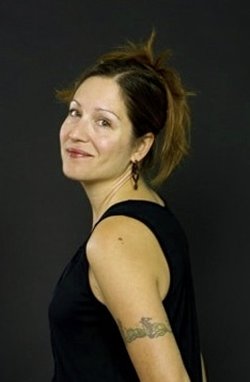 Bio: Sonia Greenfield was born and raised in Peekskill, New York, and her book, Boy with a Halo at the Farmer's Market, won the 2014 Codhill Poetry Prize. Her work has appeared in a variety of places, including in 2010 Best American Poetry, The Antioch Review, The Bellevue Literary Review, Cimarron Review, Cream City Review, The Massachusetts Review, Meridian, and Rattle. She lives with her husband and son in Los Angeles, California, where she edits the Rise Up Review and co-directs the Southern California Poetry Festival.
Photo by Naomi Brierley
Ariana Brophy is the songwriting equivalent of mulled wine; sweet, nostalgic, perfectly paired with a rainy evening and a fireplace. With vocal clarity that would suggest she has been singing a lifetime, she writes songs that weave heartbreak, love, hope and loss onto a canvas of stylized fingerpicking and expert harmony. She crafts her songs with a tuned eye for storyline and a remarkable ear for the moments a heart witnesses before the mind. She is adept at playing to the imagery around her and exploring what it means to genuinely feel. Her first EP ‘Ink And Water’ was nominated for an Edmonton Music Award in 2016, and her second EP ‘Sweet Things’ was released Sept 2016. The summer of 2016 saw Ariana playing Canmore Folk Music Festival, as well as singing harmonies for multiple artists at Edmonton Folk Festival. She continues to sing harmonies on almost any night, for over a dozen other musicians. AHC: What has this journey in music, so far, been like for you, the highs and the lows, and what life lessons do you feel you've picked up along the way? It’s been a journey, for sure. I only began playing guitar just under two years ago, so every performance at first was a challenge, every song a huge process to write. I think the hardest parts of the journey so far have been realizing just how far there is to go with my music, and how hard I will have to constantly be working to grow musically. As for highs, I have a few favourite stories, but I’ll share just one. I tell a lot of very personal stories when I play shows, typically sharing revealing information about what each song is about, or what foolish things I did to cause the song to happen, but I find it’s a very, very vulnerable thing. Normally these are stories that I wouldn’t tell most of my friends, let alone a room full of strangers, but I believe that sharing with them the reason for the song is a way for me to help them feel what I felt when I wrote it. The best shows and best nights of my career so far have been ones where people have come up to me, crying or laughing, or just very gentle in their approach, because they felt something, or they connected with me, and they feel they can tell me. AHC: What first drew you to music and what was your early musical environment like growing up? Were there pivotal songs for you then that just floored you the moment you heard them? My father is a bass player and a harmony singer, and played in our family band while he grew up, until just over five years ago. He played with his father, one of his sisters, and all of his brothers at some point or another, and even some of my cousins were involved through the years. I was toted from show to show in my carrier, and then would run onstage to take my dad juice boxes, or sit on his amp, and eventually got to sing some songs with my Grandfather or my uncle, so I think music has always been a part of who I was going to be. Specifically though, after I was born my father was laid off and spent a lot of time with me. He used to sing to me or hum in my ears, and I think the songs he used to sing made more of an impact than more popular songs in the following years. If I had to name a few, probably "More Than Words" by Extreme, and “Crying”, “Deliver Me”, and “With These Eyes” by Roch Voisine. AHC: Do you remember the first song that you ever wrote? Or that first moment when you picked up a pen and realized that you could create whole worlds just by putting it to paper? Of course! I remember thinking it was incredible, and then looking back a few months ago realizing that it was absolutely atrocious, and quite nauseating. I was sixteen, and so sure that I was in love (I wasn’t) and I had tried to write a love song for this person, being obscure about who they were and using way too many adjectives to describe things that were beautiful but totally unrelated to us. But that was before I’d really ever felt anything profound enough to write, so it came out and fell flat and I’m glad nobody besides my mother ever heard it. AHC: Which musicians have you learned the most from? Or writers, artists, filmmakers etc? I don’t think I could specifically pinpoint one or two artists, but more a melange of art that I have found. I used to use Tumblr (a blogging site) quite frequently, and would save photos or lines from books that spoke to me. For example, a line from “The Bell Jar” by Sylvia Plath reads, “I felt my lungs inflate with the onrush of scenery - air, mountains, tress, people. I thought, ‘This is what it is to be happy.’” I found myself collecting things that were subtle in their beauty, and likewise, films like Paris Je T’aime or Dreamers, where not everything is conventional, but they all have a weird sort of raw vulnerability and realness. People aren’t perfect, and I think embracing our imperfections is one of the best ways to make art. I’m not sure if that really answers the question, so as a follow up, I think the artists I learn most from are the people around me who create, who put something of themselves into what they put out into the world. AHC: What do you think makes for a good song, as you're writing and composing, is there a sudden moment when you know you've found the right mix, that perfect angle of light, so to speak? If I write a song, and then want to sing it again and again and again, I’ve done something right. Sometimes it is in the progression of the song, in coming home at the end, or finding away to express something I couldn’t without music, but almost always it is the songs where I write about a real feeling, rather than something contrived or an idea for a song. If I feel it deeply, it comes out loudly. It is unapologetic in its honesty, its fragility, in its greeting of the world. It may be a gentle song, but it is sure of itself. AHC: Do you consider music to be a type of healing art, the perfect vehicle through which to translate a feeling, a state of rupture, hope lost and regained? Does the writing and creating of the song save you in the kinds of ways that it saves us, the listener? Absolutely. I started writing after my mother passed away when I was a teen, and then again following a traumatic experience, and then again when my family fell apart. We heal ourselves when we acknowledge our weaknesses, because we spend time thinking about them, understanding them, and understanding why we feel the way we do about things. Sometimes I will write a song and then look back on it, only to go, “Where the hell did that come from.” I surprise myself more often than you might expect, and I think that paying attention to what comes out is a big part of why I am still able to write, why I am okay with some things that have happened to me, and why I am able to continue to create. AHC: What are your fondest musical memories? In your house? In your neighborhood or town? On-tour, on-the-road? Most definitely having to do with family, or my closest friends. As I mentioned, my family was very close and musical when I was growing up. Around the holidays, we would gather around the piano, and saxophones and trumpets would come out, as well as my grandfather’s fiddle. The whole family would sing, and the younger kids would dance, and it was everything the holidays are supposed to be, in my opinion. More recently, I get to sing in a trio with my friends Eva Foote and Andrea Vissia. There’s something about the way our voices blend that is invigorating, and I’m going to hold onto that feeling forever. AHC: What would be your dream gig, if you were asked to go on tour and open up for one of your musical heroes or heroines? Honestly, my dream gig or tour would be a tour of house concerts, with audiences that want to hear the stories about the music and really connect. People who want to share in a rare, honest musical experience. Playing with one of my musical idols would be amazing, but I think a dream show would be more amazing if the audience was amazing, rather than if I was playing alongside an amazing musician. Don’t get me wrong, if I had the opportunity to play with the likes of The Staves, or Brandi Carlile, or Keaton Henson, I would very probably jump at the opportunity. However, I feel strongly that the best shows are ones where the audiences are as invested as the musicians. They’re intimate. They’re beautiful. AHC: When you set out to write an album of songs, how much does 'where the world is' in its current moment, culturally, politically, otherwise, influence the kinds of stories you set out to tell, if at all? The state of the world is unavoidably involved. I don’t often sit down with the intention of writing a song about something political or cultural, but these things do tend to find their way into writing, because they’re important. Recently, as a lot of my old love songs have worked their way out of my system, I’ve found myself writing about things that I feel strongly about, like feminism, equality, and the rights and lives of minorities. We’re in an unfortunately toxic time for a lot of people, and the best way that I can think to fight the hate and anger and fear in the world is to write about it, and share love, resilience, and peace. Art has been one of the greatest ways to create conversation and change through history, and that’s not going to change anytime soon. AHC: Do you have any words of advice for other musicians and singer-songwriters out there who are just starting out and trying to find their voice and their way in this world? I know you're at an early moment in your own journey, but what are the kinds of things that you tell yourself when you begin to have doubts or are struggling with the creative process? Don't compare yourself to others. Compare yourself to yourself, and listen to your own work, but listening to others should not be about who is better, and who is worse. You are on a completely different journey than the musicians around you, and only you know if you’re making music that is doing justice to what you are capable of. You may not be the best at any of the things you are trying to do, but you can always be better, and trying to be a better songwriter, a better musician, and a better person is all that you can do. AHC: Do you have any new projects in the works you'd like to tell people about? It’s less a new project as it is an ongoing one. I’m working to continue to write with as much vulnerability and openness as possible. Lately, that has been a lot about acknowledging my mental health struggles, and the struggles in my family while we deal with my father’s recent Traumatic Brain Injury, and the associated challenges that now face him every day, and will for the rest of his life. Visit arianabrophy.com/ 1/28/2017 Three Poems by Kirby WrightNotes From the Hanged Woman Face it, we are wind From womb to the blue prom. Remember me licking Cream off your belly? Creation and death Harbor in beds. I forget why I hate you Yet want to keep my investment. I take my wrinkles to bed, Hoping to dream young. Cold tea on nightstand. Cat camped between my legs. Listen for the cracked dawn. The riot is close. I Found You in memory of Laurie I found you in the obits. We held hands during the 70s. My father drove us to the concert. We were destined to marry. We held hands during the 70s. Sorry I was late for the party. We were destined to marry. I hated you for wanting that singer. Sorry I was late for the party. Notes from our song play in my head. I hated you for wanting that singer. You wore tight white cords. Notes from our song play in my head. My father drove us to the concert. You wore tight white cords. I found you in the obits. The End of Art The wooden bench painted gray warms in morning sun. The exhibition is over, its artists shuffling sculptures and paintings in and out of the burnt yellow museum as thick as a Russian wrestler. They balance blood-and-sweat creations on defeated walks over courtyard cobbles. Display time has died. The aborted babies are packed away in trunks, strapped to roofs, and buckled into seats. The artists drive off into wind that rustles the reeds in the Baltic shallows. The snow’s on its way. Bio: Kirby Wright's first play was performed at the Secret Theatre's 2016 One Act Festival in New York. |
AuthorWrite something about yourself. No need to be fancy, just an overview. Archives
April 2024
Categories |
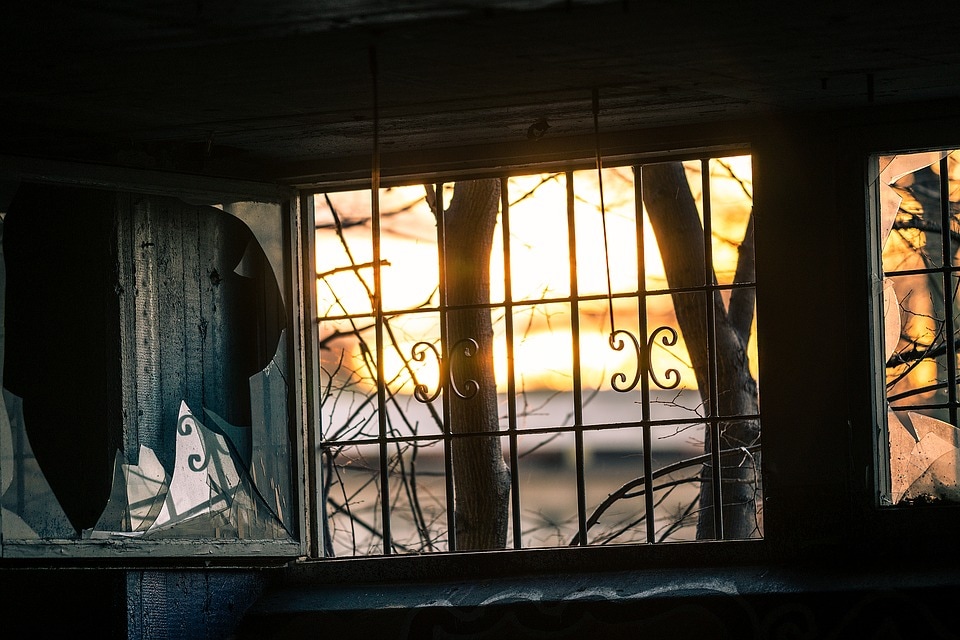
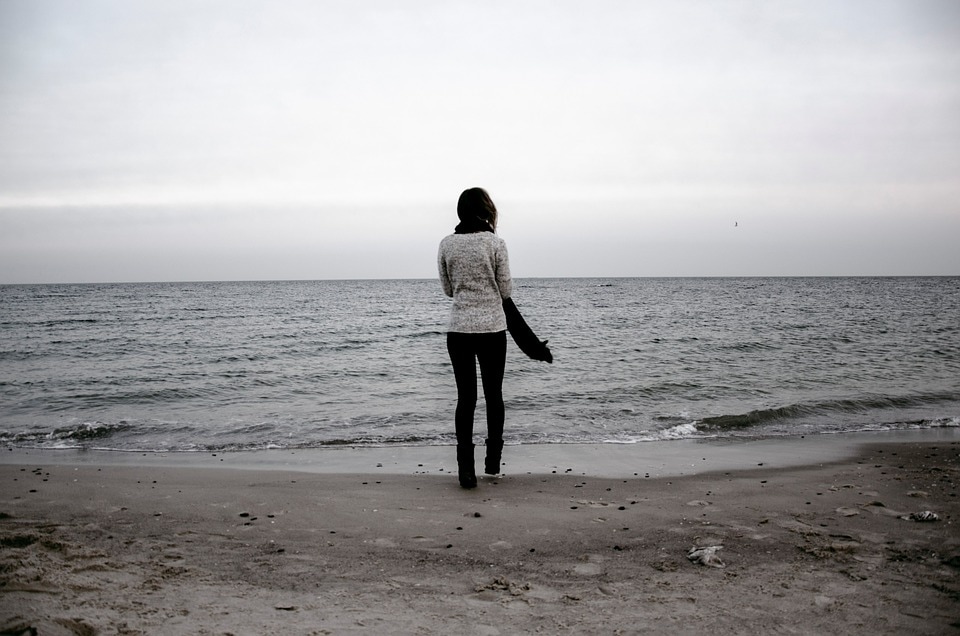
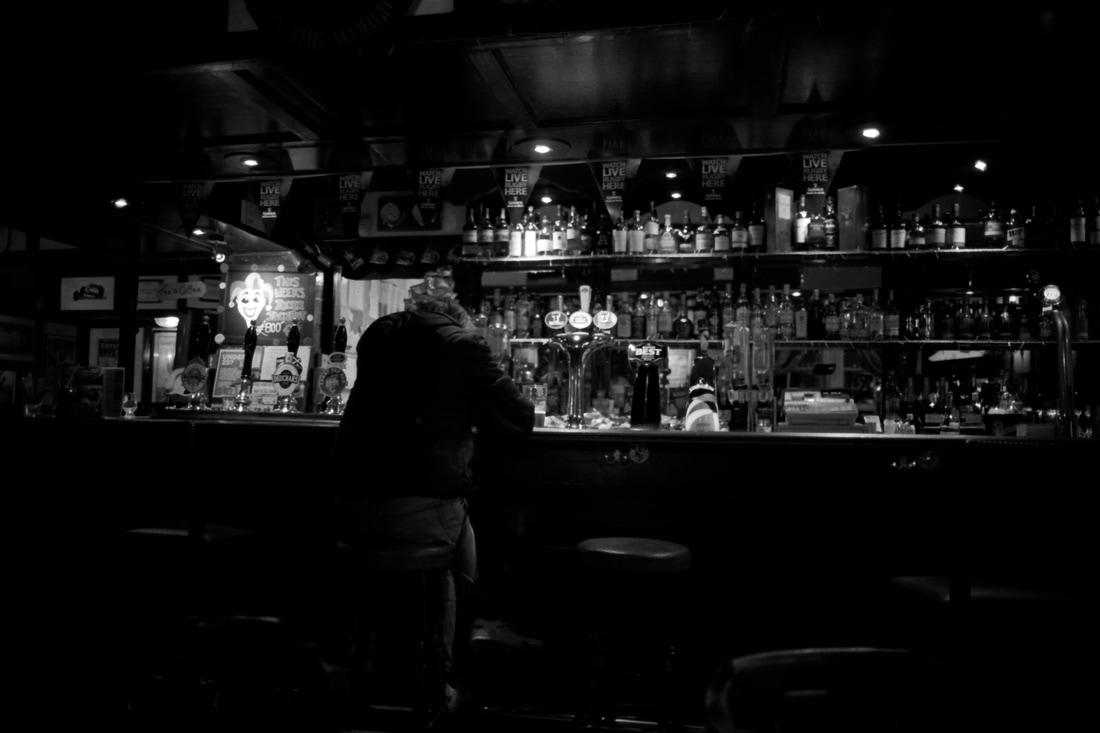
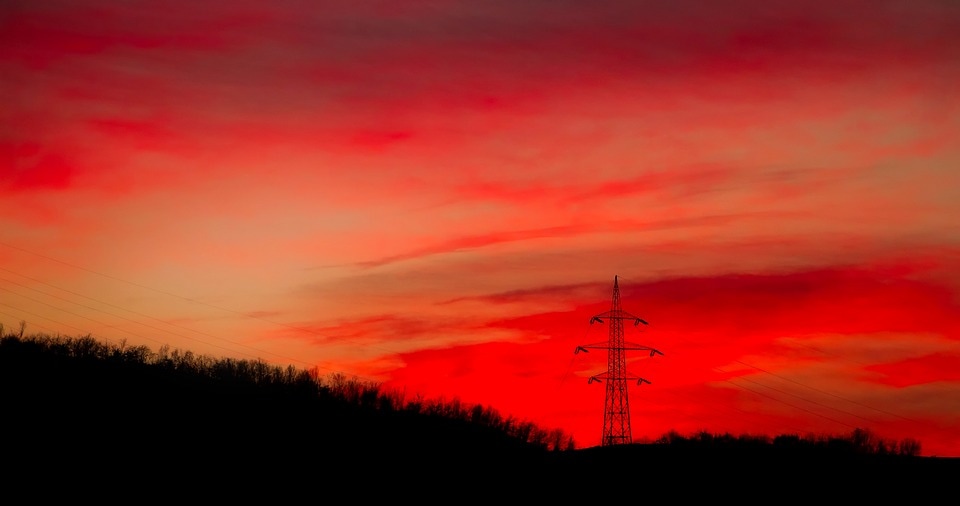
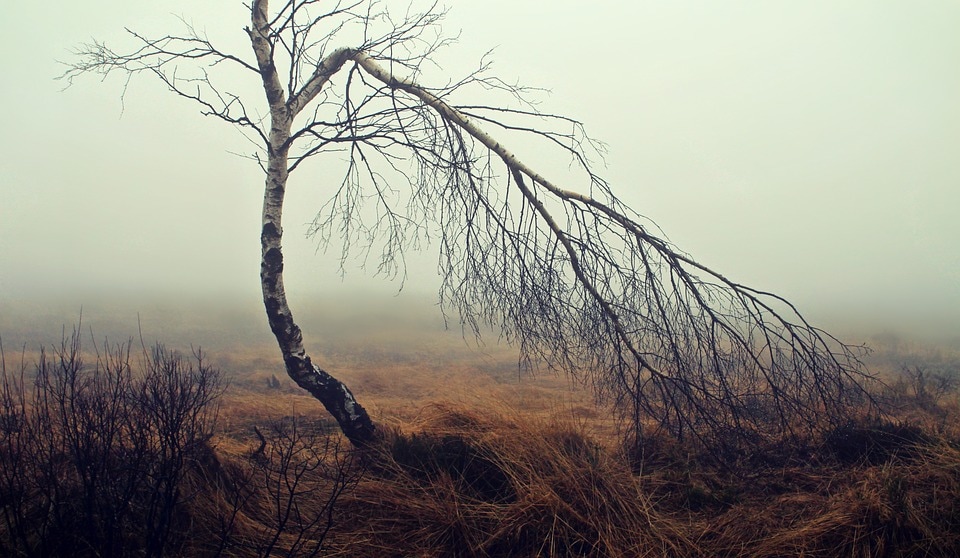
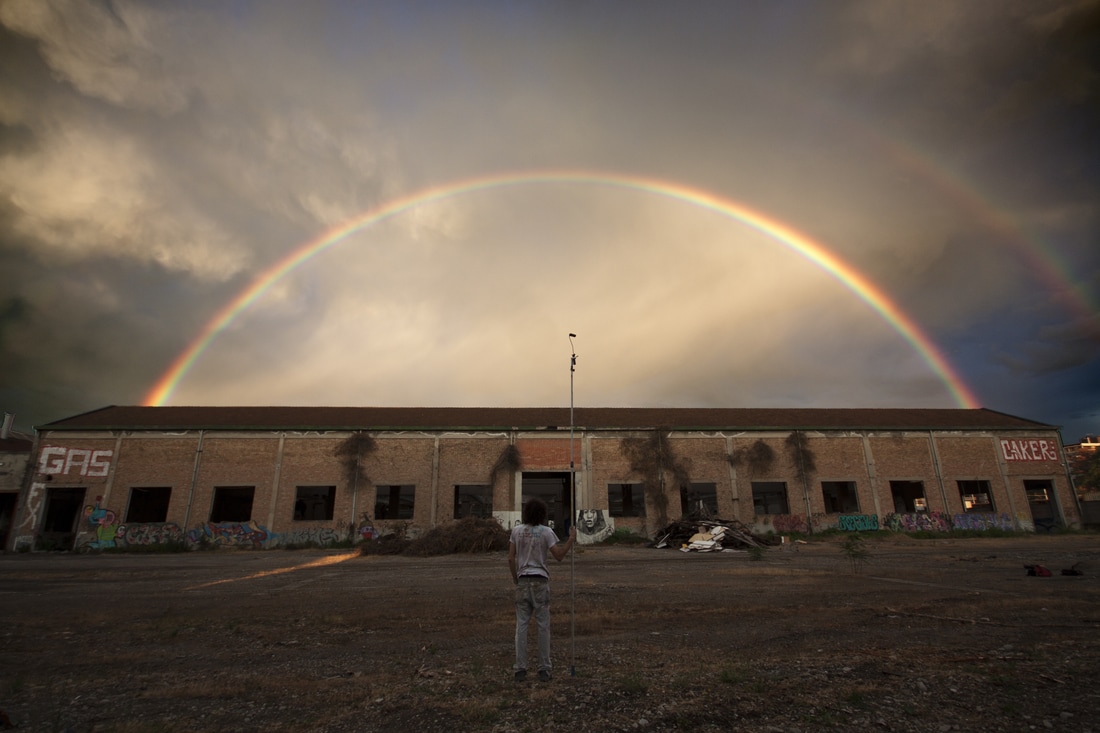
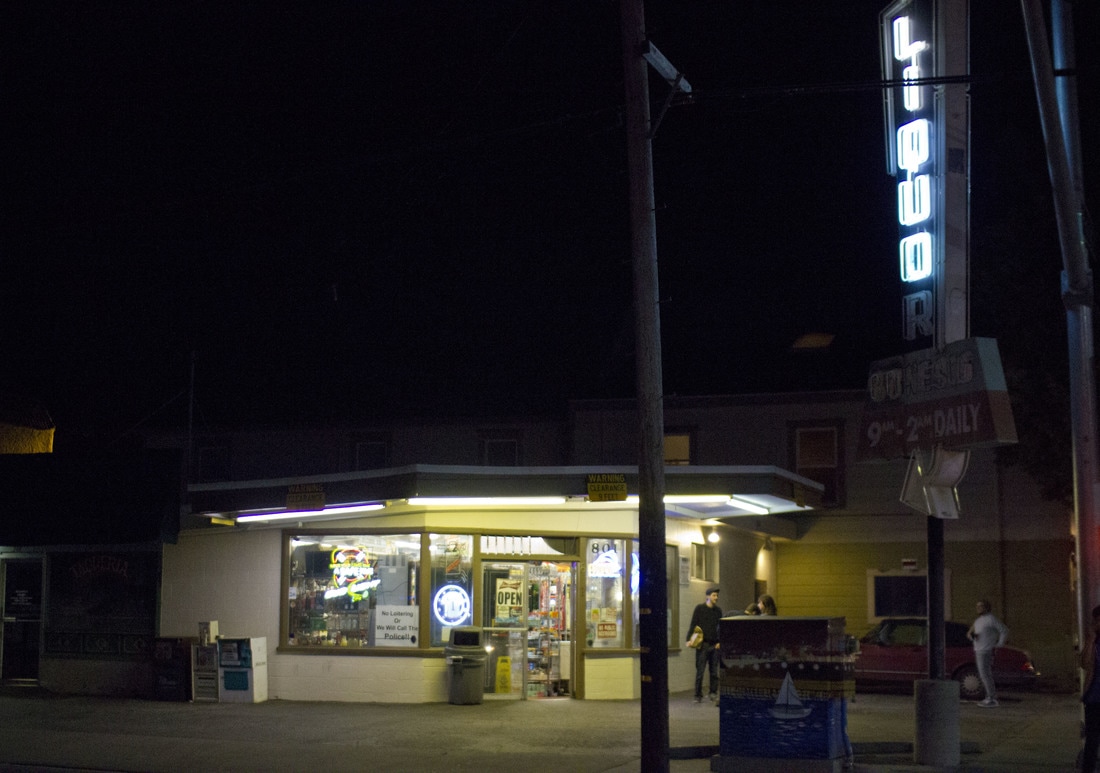
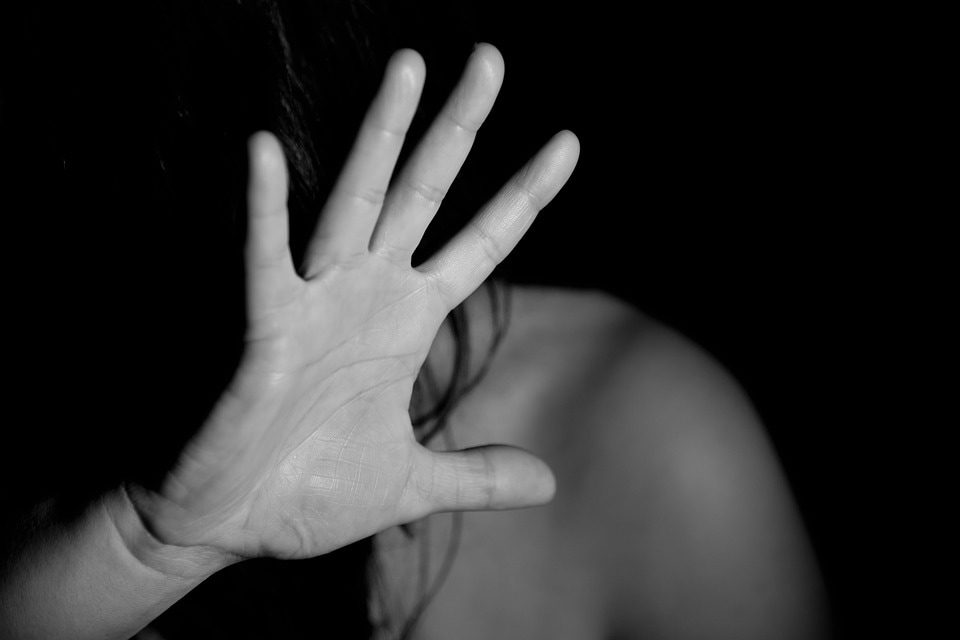
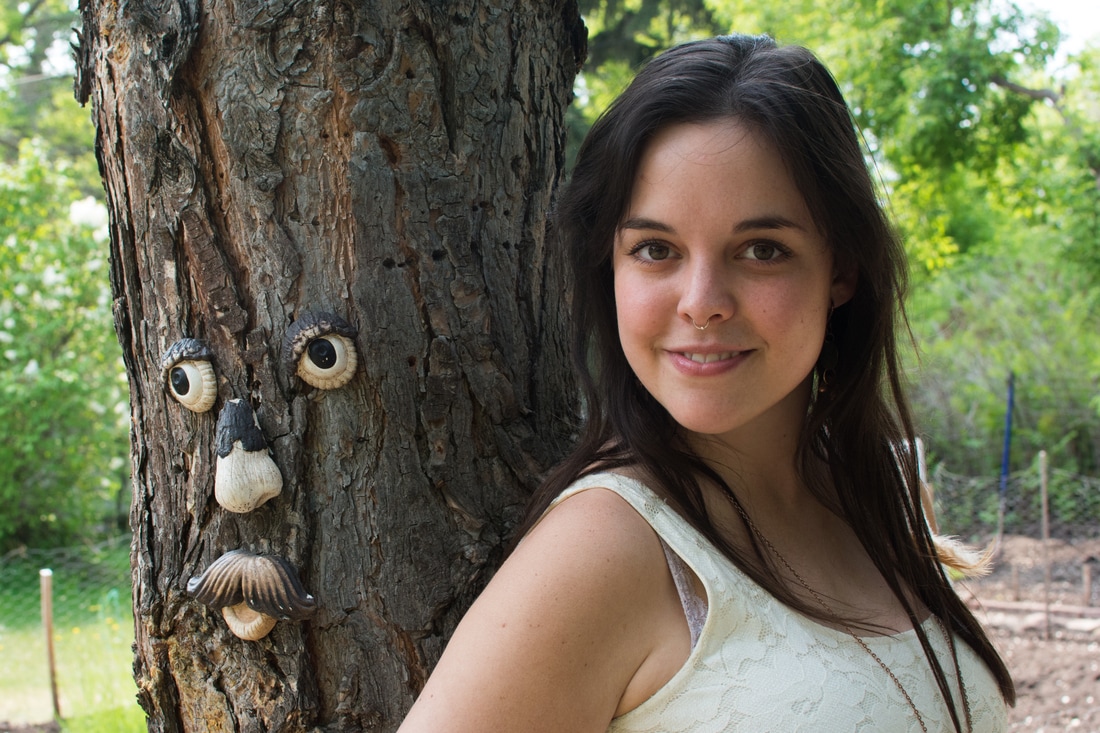
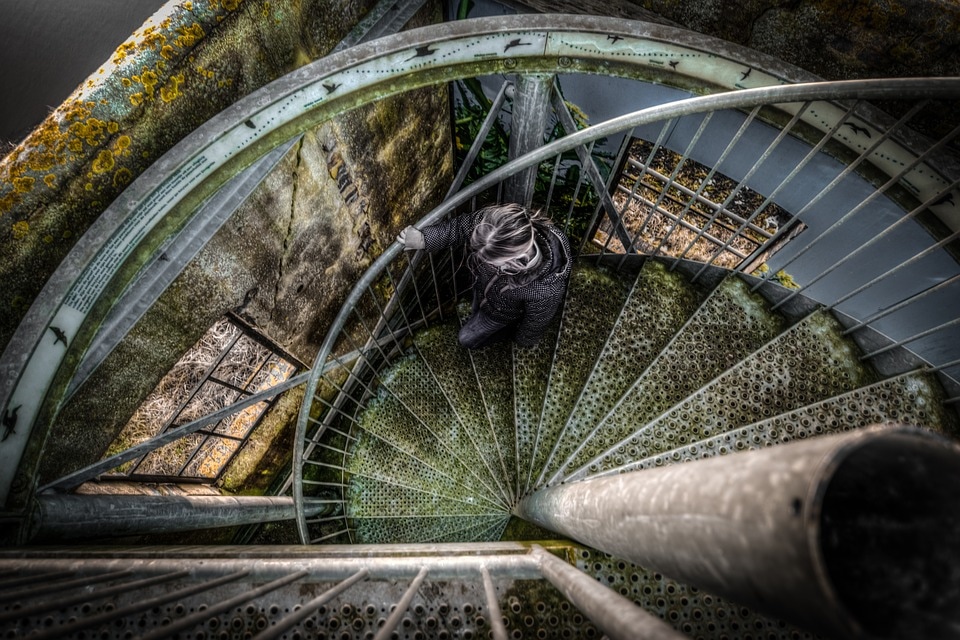
 RSS Feed
RSS Feed
